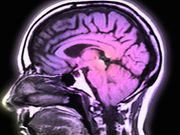Infarct volume, hyperglycemia linked to poor neurological outcome in arterial ischemic stroke
TUESDAY, May 24, 2016 (HealthDay News) — For children with arterial ischemic stroke, infarct volume and hyperglycemia, but not hypertension and fever, correlate with poor neurological outcome, according to research published online May 23 in JAMA Neurology.
Kimberly N. Grelli, M.D., from the University of Washington in Seattle, and colleagues performed a retrospective review of children aged 29 days to 18 years with their first arterial ischemic stroke. Blood pressure, blood glucose, and temperature data were collected for five days after stroke for 98 children (median age, 6.0 years; 59.2 percent male) identified with stroke.
The researchers found that 65.3 percent of children had hypertension, 68.4 percent had hypotension, 18.1 percent had hyperglycemia, and 37.8 percent had fever. An infarct size of 4 percent or greater of brain volume had the greatest association with poor neurological outcome (odds ratio, 5.6; P = 0.01). There was an independent correlation for hyperglycemia with poor neurological outcome (odds ratio, 3.9: P = 0.02). No significant correlations were seen for hypertension and fever with infarct size, poor outcome, or death. At three-month follow-up, hypertension was not documented in 27.6 percent of surviving children, and was not associated with poor neurological outcome.
“Prospective studies that systematically record blood pressure, blood glucose, and temperature data are required to further assess the associations between these potentially modifiable physiological parameters and pediatric stroke outcome,” the authors write.
Abstract
Full Text (subscription or payment may be required)
Editorial (subscription or payment may be required)
Copyright © 2016 HealthDay. All rights reserved.








